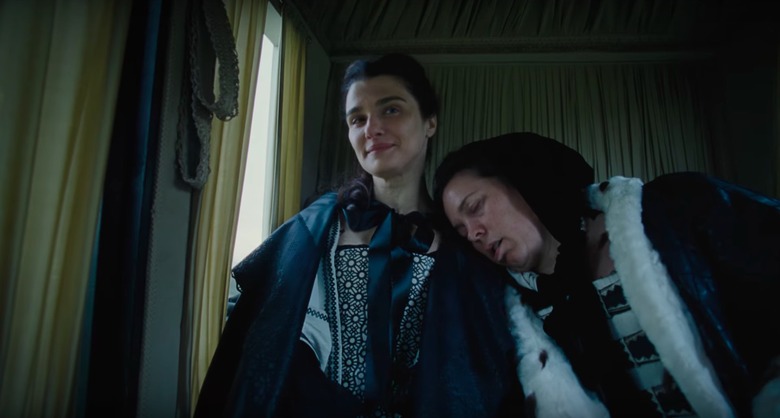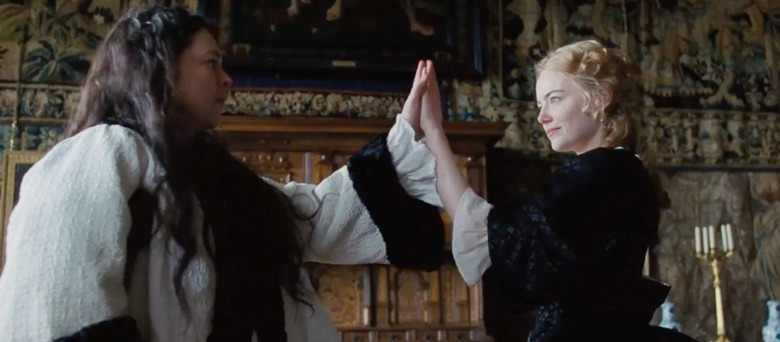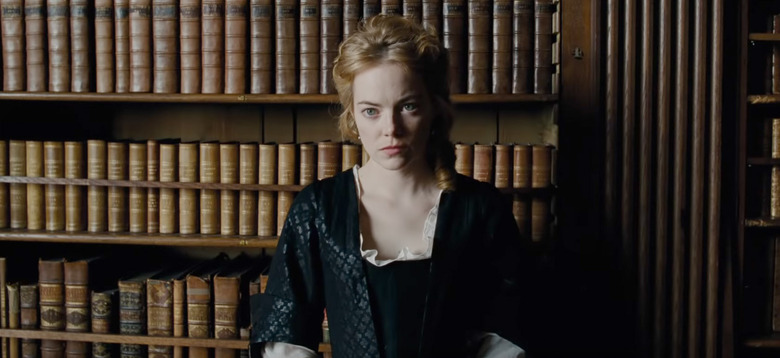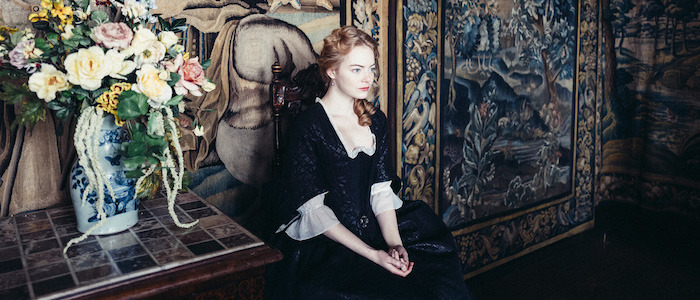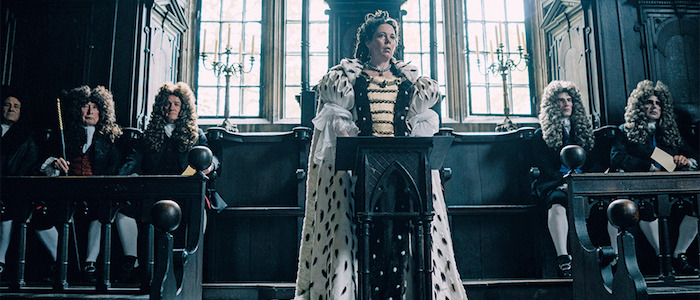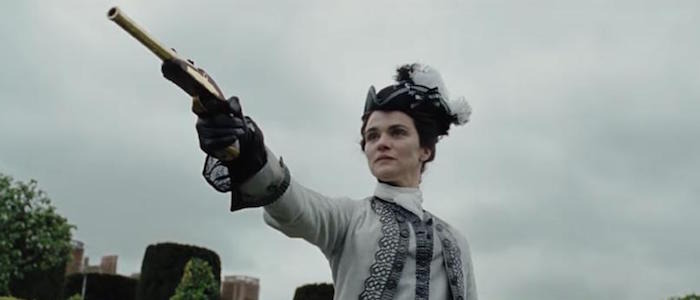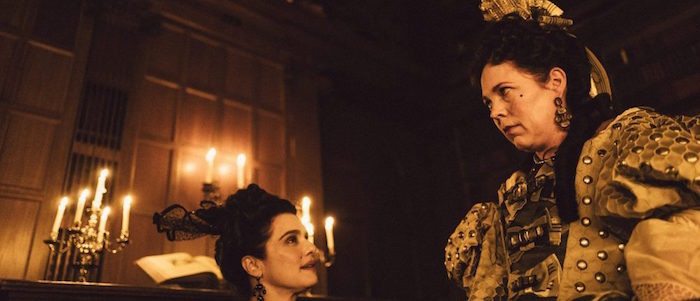7 Things We Learned About 'The Favourite' From Emma Stone, Rachel Weisz And Yorgos Lanthimos [Interview]
"There was nothing that didn't appeal to me about it," replied Emma Stone when asked about why she wanted to be a part of The Favourite, Yorgos Lanthimos' latest directorial outing. The film has been a standout on the fall film festival circuit wherever it has played. I caught it on opening night at the New York Film Festival, and it's been my favorite film of 2018 ever since.
The Favourite provides a delicious showcase for three tremendously talented actresses in a sumptuous period setting without ever getting mired in mothballs. Olivia Colman's Queen Anne provides the center of gravity, shifting the equilibrium of England with her every erratic whim. At the start of the film, Anne's mood is stabilized by a lifelong friend, Rachel Weisz' Sarah Churchill. Her hold on the queen's heart and purse strings receives a real challenge, however, when Sarah's cousin, Emma Stone's Abigail, enters the palace grounds and begins to rise in Anne's esteem.
This is not the Wikipedia version of history by any stretch of the imagination, and as such, many more questions linger after viewing than the traditional costume drama. Luckily, I was able to run a few of them by stars Emma Stone and Rachel Weisz as well as director Yorgos Lanthimos at roundtable discussions earlier this month. We talked about how The Favourite journeyed from script to screen, how everyone tuned into Lanthimos' particular wavelength and why we'll never know what the director thinks about any of his endings.
1. The film spent many years in intense, but sporadic, development.
The Favourite might be Yorgos Lanthimos' first film without a screenplay credit from either him or longtime writing partner Efthymis Filippou, but don't think that gives him any less authorship over it. When asked if he polished the screenplay to make it feel more in the vein of his singular work, Lanthimos answered affirmatively.
"We worked on this script for nine years. It was 2009 when I first read this story. No, it didn't feel at all like a film I would make. But because of the reasons that I just mentioned that I was interested in making this, I started developing this, and it took many years in order to get to where we were going, not that we [were] working all these nine years consecutively. It was a long process, I worked originally with the first writer, Deborah Davis, who had written the first script. She knows a lot about the history, the people, she had done an amazing amount of research. I worked with her in order to structure a film that I was more interested in and focus even more on the three women.
After having done that, I felt that we needed to bring in someone else with a different voice so it would acquire a very different quality. For a long time, me and the producers started reading hundreds of playwrights, screenwriters, and we ended up finding Tony McNamara – an Australian playwright – that we worked with on the script for the next seven or eight years. We ended up working over Skype and meeting in Europe in order to find the tone for the film, and although being inspired by the original story, being free and inventing a lot of elements, creating characters that felt complete within the story we're trying to tell, and create a film that was eventually going to be interesting for me to do and not just another period film."
The film saw a few casting changes as well in the development process – primarily for the part of Sarah Churchill, played by Rachel Weisz, as The Hollywood Reporter recently detailed – but once Lanthimos secured the trio of leading females, he was willing to wait until all their schedules lined up. "Each one of them was an important part of the whole puzzle," he noted.
2. Expecting a history lesson? Don’t.
If you happen to be studying Queen Anne's reign over Britain, perhaps you should look elsewhere from The Favourite to get the facts. Rachel Weisz says the film's premise does have some basis in the historical record. "Lady Sarah, my character, and the queen were childhood friends, and there's a wealth of letters between them, which are love letters," she explained.
But from there, the film fills in the gaps of the historical record with creative extrapolation. "They could be a passionate female friendship where love is declared," Weisz speculated. "We don't know for sure that they were physical lovers as well. So that was invented or imagined. We know that Abigail did come to the court and use[d] my character, and Abigail ended up being the keeper of the keys to the privy purse."
Weisz was also able to learn more about Sarah Churchill from history yet confesses it did little to affect the performance. "There are a lot of biographies, and I think I read one from cover to cover, which was really interesting but didn't really help me. I think it would have been the same had I not read it."
Emma Stone, on the other hand, had even less to go on. "I looked at Queen Anne and Sarah, some of their letters – there's not much information about Abigail," she admitted. "It's pretty limited what you can find out about her." To inform her character, Stone did more general research on the time period and worked directly with an etiquette expert to learn about the behaviors and movements of her character.
3. Stone and Weisz don’t expect you to sympathize fully with their characters.
Backstabbing, gossiping, infighting – all in a day's work in Queen Anne's court. Thankfully, both actresses claimed they pulled very little from their own lives.
"I couldn't be less like [Sarah]," Weisz said. "What I can identify with is that she's a human, she's tough and manipulative and needy and in love and bossy, she's many things."
"Even though people might not be able to relate to Abigail in terms of where she decides to go with her elements of human nature," Stone explained, "I at least got to explore a spectrum of human emotion in a very exciting way."
Abigail marks a real departure for Emma Stone, who became a household name by charming audiences from Superbad to La La Land. In The Favourite, she shakes things up by playing a character whose true nature is not immediately and unimpeachably good. But, Stone explains, she saw Abigail as something more than just "unlikable."
"To me, she is a survivor. She's had a lot of horrible experiences. She fell from an aristocratic family. She's gone through a lot. She arrives at the palace needing the very basics of safety and security, and maybe more. But that's what I see her as at her core – someone who is fighting very hard to survive."
4. Neither actress centered their characters’ sexuality in their performance.
The professional rivalry between Sarah and Abigail in The Favourite spills over into a romantic one, as each caters to Queen Anne's sexual desires to cement their favored status in the court. Yet in spite of the lesbian love triangle that forms, neither Weisz nor Stone felt the need to make a definitive statement about their character's sexuality.
"I almost see Abigail in my mind as a bit asexual," Stone suggested. "I think her sexuality is shut down because of the things that have happened to her [...] On both sides, it's for her own gain to remain safe. Again, I'm not saying that she is asexual, I'm not saying that she's not bisexual, I just think her drives to her sexuality is so secondary to her rise that it's hard for me to totally interpret what exactly the depth of her sexuality is and has been used in ways that are unfathomable."
Weisz, meanwhile, found the historical record around Sarah to complicate matters. "She's married, in reality she had children – they were left out of the film. In my mind, she's bisexual," Weisz posited. "Maybe she was just gay for the Queen and no one else. I never thought about if she slept with lots of other women."
5. How does Lanthimos get what he needs? With remarkably little direction.
One might think Yorgos Lanthimos' peculiar, often bizarre, stylings are the product of exacting control over the production. But, according to his actors, the opposite is true.
"I don't know how he does it because he doesn't ever discuss anything," Weisz noted. She further elaborated on his style:
"There's zero discussion. Zilch. Nothing. Not one word. Not like 'I want you to do this, this is what I'm looking for, this is what the character should feel,' nothing. [...] There's a wavelength that he has, and somehow or other by sheer force of his imagination, he tunes actors into his wavelength without using language. I do not know how he does it. It's kind of a 'wow.' If you ask him a question, he just won't answer it. He will not talk about anything. He'll just watch what you do, he doesn't ignore you, but he doesn't talk to you about the fiction you're portraying. You have no sense of perspective on what you're doing, it's just happening in a very unconscious way."
Stone echoed much of what Weisz observed in her assessment of Lanthimos' directorial manner:
"He's incredibly visual, pretty quiet but very funny. He doesn't want to talk about character or motivation. He just wants you to discover it on your own, which I appreciate and really like because in life, we're not sitting here thinking, 'What's your motivation? Why are you saying that to me?' [...] Yorgos likes people to feel it out and make it true for that moment. He doesn't like to think about it ahead of time – or necessarily in the moment, outside of how he feels."
Lanthimos describes his own style as arising from rejecting an obsessive analysis or intellectualization.
"[...] if you start intellectualizing a scene or the character and being very concrete and precise about those kinds of things, you limit the scope of the character and make everything feel more self-conscious having decided that this is what this means and this is how you should say it. It can mean different things for different people. Sometimes people say things and don't really know what they mean by what they're saying. Subconsciously, it might mean something different. There's such complexity in human behavior which would be really hard to just go, 'Of course, this is how you say it because this is what it means.' I find that so limiting. I think there's all these unknown things you can tap into when you just leave things open and nothing is forbidden. Then you allow yourself to mold that thing that has been created by freedom and spontaneity and flexibility. That's why I avoid limiting performances of actors and characters."
6. Is the film a comedy? Depends.
The Favourite is chock full of absurd moments and quotable quips, but a dark turn in the final act makes it a little unclear how to classify the film. In other words, it's just like any other Yorgos Lanthimos film.
At the time of our roundtable, Stone said she had seen the film three times, each viewing changing her experience of the film slightly.
"I laughed a lot the first time. I laughed a little less the second time. And by the third time, I was just really heartbroken. I think it's so amazing how layered it is that Yorgos and Tony found a way to tie this all together in such a wonderful way, it really, really broke my heart as time has gone out. Which is my favorite kind of film that can encapsulate all of that, it can make you laugh and cry and feels very true even though it's this outlandish circumstance and world. Even the outsized dialogue."
Unsurprisingly, Lanthimos said this pile-up of moods and genres is a very intentional choice. Fans of the director's unique sensibility will recognize his ambiguity is a reflection of his deliberation, not his ambivalence. When asked about how he would categorize The Favourite, Lanthimos explained his approach to genre in detail.
"When I'm making the film, I don't really think in those [genre] terms. What we try to do is create a tone, and usually what I'm interested in is creating a tone that falls between places. At times, it's hilarious and funny. Others, it's sad and dramatic or melodramatic. All those things clashing with each other, creating a balance that you can't always fine-tune or even predict, mainly because people are so different, and they perceive it in a different way. Something that's a hilarious comedy for someone else might be a drama. Or moments in a film that alternate between the two, people according to who they are, their experience, their mood when watching, fall more towards one aspect of the film and see it more that way. It really changes, especially if you're alternating between tones and moods, or the tone itself is not clearly defined – which I enjoy. [...] For me, it's always a struggle of balance and feeling that it's striking a good balance and creates a tone that feels relatively original and you can't really pinpoint what it is and makes you feel uncomfortable or entertained or disgusted through different variations."
7. Don’t expect to get that ending broken down for you.
Still thinking about the ending of a previous Lanthimos film? You're not alone – not even his actors know. Emma Stone said the filmmaker's approach is that it's more interesting for viewers to follow their own path and ask what it all means.
"Yorgos won't explain any of his endings to us or to anyone," Stone explained. "Like Dogtooth, 'Tell me what happens in the trunk!' He's like, 'It doesn't matter, you have to come up with it.' Or The Lobster with the knife, what did he do?! He's never said anything about it."
Stone did have an interpretation of the film's searing final sequence, though, but she only shared it on the condition that no one at the table would print it. Unlike pretty much any character in The Favourite, I will not betray her trust. (But, hey, it's your own interpretation that Lanthimos deems most important anyways!)
***
The Favourite opens in limited release on November 23, 2018 before expanding throughout the month of December.

